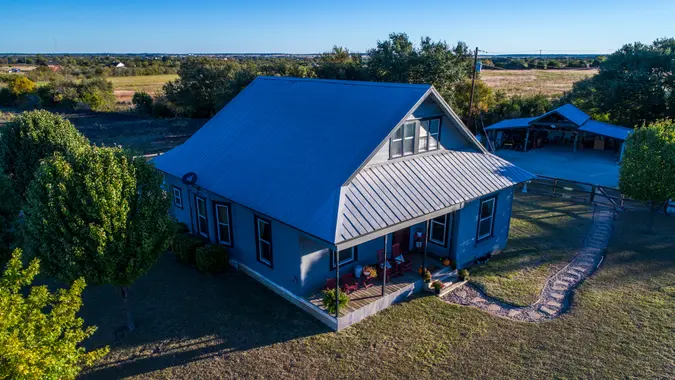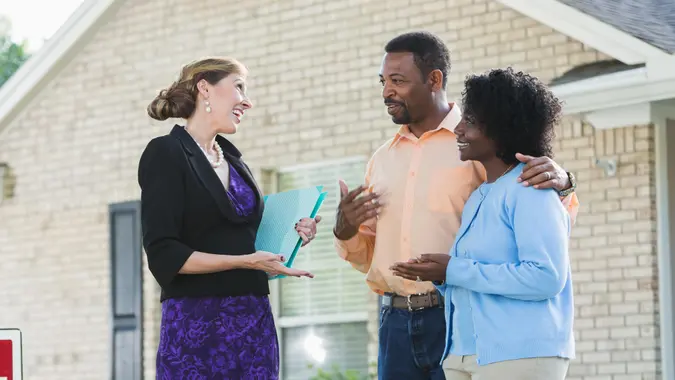Thinking About a Reverse Mortgage? Here Are 4 Expert Reasons To Think Again

Commitment to Our Readers
GOBankingRates' editorial team is committed to bringing you unbiased reviews and information. We use data-driven methodologies to evaluate financial products and services - our reviews and ratings are not influenced by advertisers. You can read more about our editorial guidelines and our products and services review methodology.

20 Years
Helping You Live Richer

Reviewed
by Experts

Trusted by
Millions of Readers
According to the U.S. Department of Housing and Urban Development, almost 100,000 reverse mortgages were issued from 2022 to 2023. This shows that reverse mortgages are popular among seniors looking to supplement their income.
A reverse mortgage, or home equity conversion mortgage (HECM), allows homeowners aged 62 and older to convert their home equity into cash without selling their property. Instead of making mortgage payments, lenders loan borrowers money.
Sounds like a great idea. However, unlike traditional mortgages, the loan balance grows over time due to accumulating interest and fees, significantly reducing the home’s equity.
While these reverse mortgages can provide much-needed financial aid, they have notable downsides, such as disqualification from government assistance and potential inheritance complications. If you want to take a reverse mortgage, you need to be very cautious. It’s best to be informed before doing a reverse mortgage.
Here are four reasons to think twice before getting a reverse mortgage.
You Might Lose Your Permanent Residency
Apart from a quick buck when you’re cash-strapped, the most appealing aspect of reverse mortgages is the “guarantee” of never losing your home.
That initial cash loan from your lender might seem like a drop in the ocean compared to your home’s equity, but in time, once you’re used to taking the loan, your property loses value.
When your home loses value, it forces a Deed-in-Lieu of Foreclosure. This is the agreement between you (the borrower) and the lender to transfer the house to the lender. It’s a common thing when homeowners take reverse mortgages.
Realtors are always advising homeowners against HECM loans.
“I understand the appeal of reverse mortgages for seniors, especially those that are cash strapped. However, the loan balance increases over time due to interest and fees, which are added to the loan balance instead of being paid out-of-pocket,” said Joe Muck, a Detroit realtor.
Muck also noted how these accumulating interest rates can quickly eat away at the homeowners’ equity. He highly recommends against taking a reverse mortgage.
You Are Not Relieved of Financial Obligations
Yes, a reverse mortgage does have some tax benefits. The IRS recognizes HECM as a loan, which means no income and, therefore, no tax.
But you’re still financially obligated to pay for the house. “A reverse mortgage does NOT relieve the homeowner of other expenses, so it does leave them at risk of foreclosure. They still must cover property taxes, homeowner’s insurance, and maintenance,” said Muck.
Failing to pay for these requirements will result in a Deed-in-Lieu of Foreclosure.
While the cash loan is handy, the extra payments must come out of your pocket. And if you’re using the HECM loan to pay for the property tax or the hazard insurance, then what’s the point?
You’ll compound the interest rates as you lose your home’s equity. Don’t forget you’ll occasionally need to repair something on the house, maybe a roof or something, which costs even more.
You Could Leave Your Heirs with No Home
Muck stated that “since the loan must be repaid when the homeowner passes away or sells the home, the property may need to be sold, reducing the inheritance left for family members. If heirs want to keep the home, they will most likely have limited time to pay off the loan.”
“Heirs often have around 6 months to satisfy a reverse mortgage. They could continue making the payments if the house had a conventional mortgage, whereas a reverse mortgage must be satisfied upon death,” said Ryan Dossey, co-founder of SoldFast.
Dossey added that “in the event that property values decline and the home becomes ‘underwater,’ the heirs would have to pay more for it than it’s worth to keep it. Their likely option is simply signing the home over to the bank.”
No More Medicaid, SSI, and Insurance Cover
Eligibility to access Medicaid and insurance coverage is very significant. Although the cash you get from the reverse mortgage is attractive and you don’t need to pay taxes on it, you shouldn’t relax and lose the capability to maintain your home.
Taking reverse mortgages may invalidate your access to crucial benefits such as Medicaid and Supplemental Security Income (SSI).
Muck explained that “if the homeowner(s) are on any kind of income-based government assistance such as Medicaid or Supplemental Security Income, they could be at risk of disqualifying themselves from this aid. The income from a reverse mortgage may be considered a countable asset.”
Being elderly, your health and that extra income are things you don’t want to gamble with. Talk this out with your financial advisor before taking a reverse mortgage.
 Written by
Written by  Edited by
Edited by 

























